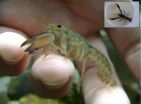Grandmas stay sharp when they care for grandkids once a week
2014-04-08
(Press-News.org) CLEVELAND, Ohio (April 8, 2014)—Taking care of grandkids one day a week helps keep grandmothers mentally sharp, finds a study from the Women's Healthy Aging Project study in Australia, published online today in Menopause, the journal of The North American Menopause Society (NAMS). That's good news for women after menopause, when women need to lower their risks of developing Alzheimer's disease and other cognitive disorders.
On the other hand, taking care of grandchildren five days a week or more had some negative effects on tests of mental sharpness. "We know that older women who are socially engaged have better cognitive function and a lower risk of developing dementia later, but too much of a good thing just might be bad," said NAMS Executive Director Margery Gass, MD.
The 186 Australian women, ages 57 to 68, took three different tests of mental sharpness and also noted whether they thought their own children had been particularly demanding of them in the last year. Among the 120 grandmothers, those who spent one day a week taking care of grandchildren performed best on two of the three tests. But those taking care of grandchildren for five or more days a week did significantly worse on one of the tests, which assesses working memory and mental processing speed.
That was a finding the researchers didn't expect. However, they also found that the more time grandmothers spent taking care of the grandchildren, the more they felt that their children had been more demanding of them, so maybe mood plays a role in the unexpected result. The investigators are already following up with more research.
Although other research has looked at the relationship between mental sharpness and being socially engaged, this is the first time that this type of research has looked at grandmothering. "Because grandmothering is such an important and common social role for postmenopausal women, we need to know more about its effects on their future health," says Dr. Gass. "This study is a good start."
INFORMATION:
The article will be published in the October issue of the print edition of Menopause.
Founded in 1989, The North American Menopause Society (NAMS) is North America's leading nonprofit organization dedicated to promoting the health and quality of life of all women during midlife and beyond through an understanding of menopause and healthy aging. Its multidisciplinary membership of 2,000 leaders in the field—including clinical and basic science experts from medicine, nursing, sociology, psychology, nutrition, anthropology, epidemiology, pharmacy, and education—makes NAMS uniquely qualified to serve as the definitive resource for health professionals and the public for accurate, unbiased information about menopause and healthy aging. To learn more about NAMS, visit http://www.menopause.org.
ELSE PRESS RELEASES FROM THIS DATE:
Graphic photos on tobacco packs save lives: WHO report
2014-04-08
BEIJING, 8 April 2014 – Large, graphic health warnings on tobacco packets in China would increase awareness about the harms of smoking, help to cut smoking rates, and in doing so save lives according to global studies. These are the key findings from a new report, Tobacco health warnings in China – Evidence of effectiveness and implications for action, from the World Health Organization (WHO) and the International Tobacco Control Policy Evaluation Project (ITC Project), released today.
"This new report presents a very compelling case for the introduction of large, pictorial ...
A new tiny species of crayfish from the swamps of coastal eastern Australia
2014-04-08
Hidden in one of Australia's most developed and fastest growing areas lives one of the world's smallest freshwater crayfish species. Robert B McCormack the Team Leader for the Australian Crayfish Project described the new species belonging to the genus Gramastacus, after 8 years of research in the swamps and creeks of coastal New South Wales, Australia. The study was published in the open access journal ZooKeys.
Being a small crayfish species it has remained undescribed and undiscovered in one of the fastest developing regions of Australia. Only one other species of Gramastacus ...
Common diabetes treatment could extend hypoglycemia
2014-04-08
Researchers at the University of Adelaide have discovered that a common treatment for people with type 2 diabetes could cause longer-than-normal periods of the low blood sugar reaction hypoglycemia, which may result in increased health risks to people with diabetes.
The treatment is the use of the peptide GLP-1 (glucagon-like peptide 1) in combination with insulin, which is now used throughout the world as a standard therapy for patients with type 2 diabetes.
A team of researchers at the University of Adelaide's School of Medicine has investigated the impact of this ...
Good provider communication improves antidepressant adherence for diabetes patients
2014-04-08
OAKLAND, Calif., April 8, 2014 — Adult patients with diabetes who trust their medical provider and feel included in treatment decisions are significantly more likely to take and maintain a newly prescribed antidepressant medication, according to a new study in the Journal of General Internal Medicine.
The study, conducted by researchers at the Kaiser Permanente Division of Research and the University of Washington, School of Medicine, included 1,500 patients with long-standing diabetes, who were prescribed antidepressants.
"In patients with diabetes, depression has ...
Researchers measure smartphone malware infection rates
2014-04-08
There is a steady stream of news stories and announcements about how many more new strains of Android malware appear in every passing year. Data showing infection rates in the real world has been hard to come by. There is a lot of data about the number of different malware samples discovered but not so much about the extent they are actually found in the wild. If smartphones are infected to the same extent as personal computers used to be, the resulting damage would be much more severe.
The few estimates that were out there vary greatly: ranging from more than 4 per ...
Scientists disagree on responsible research
2014-04-08
"We have, on the one hand, scientists who are convinced that they should be left alone in their ivory tower and that neither politicians nor the general public should interfere with their research activities. In their eyes, the key to conducting responsible science is to protect it from external interest because that will introduce harmful biases. Science should therefore be completely independent and self-regulated in order to be responsible," says communication researcher Maja Horst from the University of Copenhagen. She continues:
"But, on the other hand, there are ...
Improved access to integrated biodiversity data for science, practice, and policy
2014-04-08
The world's biodiversity is in an ongoing dramatic decline that despite conservation efforts remains unprecedented in its speed and predicted effects on global ecosystem functioning and services. The lack of available integrated biodiversity information for decisions in sectors other than nature conservation has been recognized as a main obstacle and the need to provide readily accessible data to support political decisions has been integrated into the CBD's "Strategic Plan for Biodiversity 2011–2020" and the Aichi targets.
A review paper recently published in the open ...
New method confirms humans and Neandertals interbred
2014-04-08
BETHESDA, MD – April 8, 2014 – Technical objections to the idea that Neandertals interbred with the ancestors of Eurasians have been overcome, thanks to a genome analysis method described in the April 2014 issue of the journal GENETICS. The technique can more confidently detect the genetic signatures of interbreeding than previous approaches and will be useful for evolutionary studies of other ancient or rare DNA samples.
"Our approach can distinguish between two subtly different scenarios that could explain the genetic similarities shared by Neandertals and modern humans ...
Teenagers' pornography and sexual experiences -- fewer differences than expected
2014-04-08
Although a greater proportion of teenage boys than girls watch and fantasise about sex they have seen in pornography, there are no differences between the sexes when it comes to what types of sex they fantasise about. This is shown in a new study from Uppsala University that is published in Journal of Developmental and Behavioral Pediatrics.
Using questionnaires, Magdalena Mattebo, researcher at the Department of Women's and Children's Health at Uppsala University, investigated the sexual experiences and pornography consumption of more than 800 Swedish upper-secondary ...
Are Southern death-row inmates more polite?
2014-04-08
Los Angeles, CA (April 8, 2014) Southern states are known to uphold a culture of honor and adhere to traditional politeness norms, but does this hold true for death-row convicts? A new article published today in SAGE Open finds that Southern death-row offenders are more likely to apologize for crimes in their final statements than offenders from other regions of the U.S.
Researcher Judy Eaton analyzed executed prisoners' final statements from across the U.S. between January 2000 and December 2011. Of the 299 Southerners and 60 non-Southerners studied, offenders were two ...

